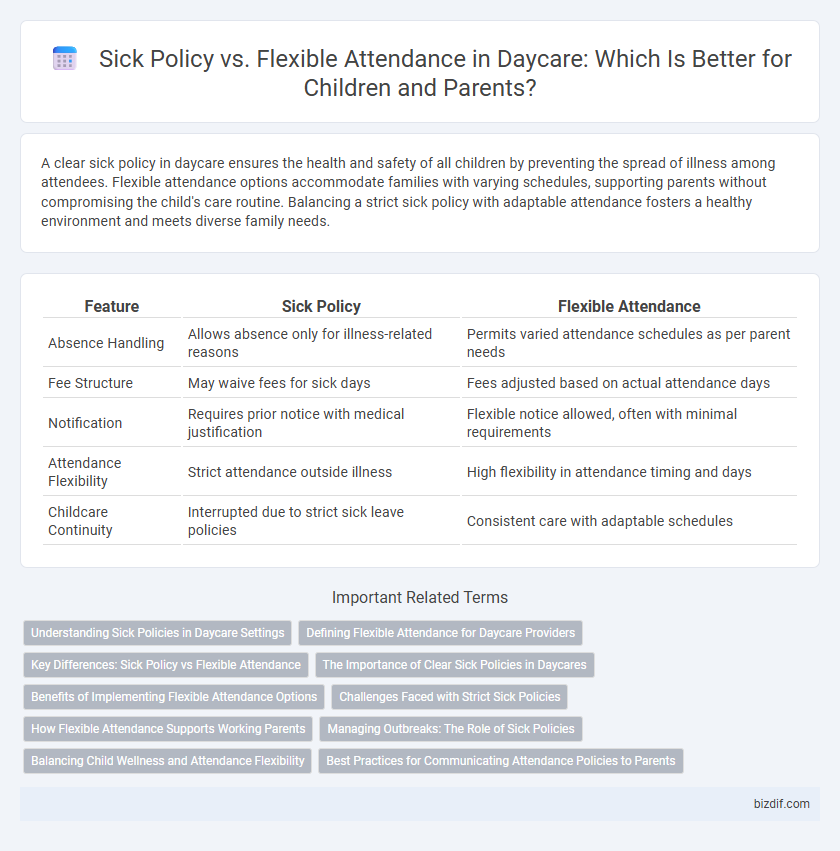A clear sick policy in daycare ensures the health and safety of all children by preventing the spread of illness among attendees. Flexible attendance options accommodate families with varying schedules, supporting parents without compromising the child's care routine. Balancing a strict sick policy with adaptable attendance fosters a healthy environment and meets diverse family needs.
Table of Comparison
| Feature | Sick Policy | Flexible Attendance |
|---|---|---|
| Absence Handling | Allows absence only for illness-related reasons | Permits varied attendance schedules as per parent needs |
| Fee Structure | May waive fees for sick days | Fees adjusted based on actual attendance days |
| Notification | Requires prior notice with medical justification | Flexible notice allowed, often with minimal requirements |
| Attendance Flexibility | Strict attendance outside illness | High flexibility in attendance timing and days |
| Childcare Continuity | Interrupted due to strict sick leave policies | Consistent care with adaptable schedules |
Understanding Sick Policies in Daycare Settings
Understanding sick policies in daycare settings is essential for maintaining a healthy environment and preventing the spread of illnesses among children and staff. Clear guidelines define when a child should stay home, such as the presence of fever, vomiting, or contagious conditions, ensuring timely care and reducing disruption. Flexible attendance options allow parents to adjust schedules without penalties, supporting family needs while prioritizing the wellness of the entire daycare community.
Defining Flexible Attendance for Daycare Providers
Flexible attendance in daycare allows parents to adjust drop-off and pick-up times based on their work schedules or emergencies, promoting convenience without compromising children's care. Unlike strict sick policies that require children to stay home when ill, flexible attendance accommodates variations in daily attendance and supports families with unpredictable routines. Daycare providers implementing flexible attendance foster a responsive environment that balances child well-being and parental needs.
Key Differences: Sick Policy vs Flexible Attendance
Sick policy in daycare centers mandates a child's absence when exhibiting symptoms of contagious illness, ensuring health and safety by minimizing infection risks among children and staff. Flexible attendance allows parents to adjust drop-off and pick-up times or attend on non-regular days, accommodating varying schedules while maintaining enrollment. The key difference lies in sick policy prioritizing strict health guidelines and absence during illness, whereas flexible attendance emphasizes adaptable scheduling without compromising the child's wellbeing.
The Importance of Clear Sick Policies in Daycares
Clear sick policies in daycares are essential to prevent the spread of contagious illnesses among children and staff, ensuring a healthy environment. These policies specify when a child must stay home, outline symptoms to watch for, and detail procedures for notifying the center, reducing confusion and potential health risks. Clear guidelines support both caregivers and parents in maintaining attendance without compromising the well-being of the entire daycare community.
Benefits of Implementing Flexible Attendance Options
Flexible attendance options in daycare settings reduce stress for parents by accommodating varying schedules and unexpected absences, promoting consistent child enrollment and satisfaction. This approach minimizes the spread of illness by allowing sick children to stay home without penalizing families, supporting overall health and safety. Daycares benefit from improved attendance rates and stronger family engagement, enhancing the childcare environment and operational stability.
Challenges Faced with Strict Sick Policies
Strict sick policies in daycare often lead to challenges such as increased parental stress and child absenteeism, disrupting children's routine and social development. These rigid rules may force parents to miss work or seek alternative care, impacting family stability and childcare consistency. Balancing health safety with flexible attendance supports better child well-being and accommodates diverse family needs.
How Flexible Attendance Supports Working Parents
Flexible attendance policies in daycare centers allow working parents to adjust drop-off and pick-up times based on their work schedules, reducing stress and improving work-life balance. Unlike strict sick policies that mandate full days missed, flexible attendance accommodates occasional absences without penalties, ensuring parents can maintain employment while managing childcare. This adaptability supports parental productivity and fosters a cooperative relationship between families and daycare providers.
Managing Outbreaks: The Role of Sick Policies
Strict sick policies in daycare centers significantly reduce the transmission of contagious illnesses, ensuring a safer environment for children and staff during outbreaks. Flexible attendance policies that allow parents to keep sick children at home without penalty play a crucial role in minimizing the spread of infections. Effective management of outbreaks relies on clear communication, prompt exclusion of symptomatic individuals, and adherence to health guidelines within daycare facilities.
Balancing Child Wellness and Attendance Flexibility
Daycare sick policies ensure a healthy environment by requiring children to stay home when exhibiting symptoms of contagious illnesses, minimizing the spread of infections among children and staff. Flexible attendance options accommodate families facing unpredictable schedules or mild symptoms, supporting consistent child engagement without compromising wellness protocols. Balancing strict sick policies with adaptable attendance fosters both child health and family convenience, enhancing overall daycare satisfaction and safety.
Best Practices for Communicating Attendance Policies to Parents
Clear communication of sick policy and flexible attendance guidelines prevents misunderstandings and promotes child health in daycare settings. Providing parents with detailed written documentation, regular updates, and direct contact channels ensures they are informed and can plan accordingly. Emphasizing transparency and consistency in policy enforcement fosters trust and cooperation between daycare providers and families.
Sick policy vs Flexible attendance Infographic

 bizdif.com
bizdif.com